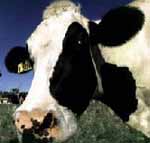As Australians continue to be able to buy milk at $1 a litre, a Charles Sturt University (CSU) academic has urged consumers to reflect on the real cost of food production for Australian producers.
Associate Professor Philip Eberbach, acting Head of the School of Agricultural and Wine Sciences at CSU, is concerned that the ongoing ‘milk price war’ is not sustainable for the dairy sector. He doesn’t believe supermarkets can continue to subsidise the sale of cheap milk in the long term.
“These price levels are not sustainable so at some point the retail sector will look to where they can cut costs,” Professor Eberbach said.
 “The dairy farmer is the obvious target and it is these producers who will likely have to bear the cost of price cuts when production contracts are renegotiated. This scenario is leaving dairy farmers extremely nervous.”
“The dairy farmer is the obvious target and it is these producers who will likely have to bear the cost of price cuts when production contracts are renegotiated. This scenario is leaving dairy farmers extremely nervous.” Professor Eberbach warns that if this retail price structure continues producers are likely to look at how they run their operations and where they can reduce costs whilst remaining profitable enterprises.
“Ultimately we could see the loss of dairy farmers from a sector which is already very efficient due to industry rationalisation.”
On the Senate inquiry into the impact on the dairy industry, Professor Eberbach said, “It will be a useful process to undertake in the long-term if Australia is serious about maintaining a viable dairy industry.”
Meanwhile, Mr Ian Coghlan from CSU’s School of Business said one of the long term aims of supermarkets in slashing the price of milk is to increase the market share of their own milk brand and ultimately boost their share of the wider grocery market.
He explained that a greater share of the consumer market will give a retailer greater power to dictate terms to food suppliers – in this case milk processors and dairy farmers.
Mr Coghlan, who is researching agricultural marketing, said, “Customer sovereignty or loyalty, which is what retailers are seeking by offering milk at one dollar a litre, is an extremely important basis for competition in any industry.
He added that many agricultural producers in Australia, including dairy farmers, are sandwiched between the small number of suppliers from whom they purchase farm inputs and the relatively few buyers they can sell their produce to. “The result is that they are price takers who are subject to the strategic moves of more powerful players up and down the value chains of their industries.”





Social
Explore the world of social